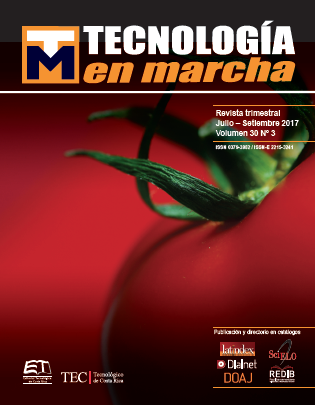Comportamiento de nematodos fitoparásitos en dos sistemas de cultivo de tomate convencional en Costa Rica
Main Article Content
Abstract
This research was conducted in the cantons of Grecia (tomato in associated with coffee) and Heredia (tomato monoculture) in the Western Region of Costa Rica, during September 2012 and February 2013. The monthly sampling consisted of collecting soil and tomato roots in monoculture and agricultural areas with coffee, and by centrifugation method - flotation extracted, identified and quantified the nematodes. The nematodes (soil and roots) were Meloidogyne, Helicotylenchus, Criconemoides, Pratylenchus, Aphelenchus.
The first few months after transplantation (DDT) populations of plant parasitic nematodes were low. From the fourth month DDT in areas in partnership, soil samples without oxamyl showed increases in populations of Meloidogyne (48-7.300 individuals) and Helicotylenchus (234-2.100), whereas in areas with oxamyl, Meloidogyne increase of 50 individuals roots 2.800. In tomato roots without oxamil areas, the population of Meloidogyne (1.625 individuals to 59.200) and Helicotylenchus (2.175-3.800) increased; and in areas with oxamyl, population of Meloidogyne increased from 3.288 to 68.467.
Tomato monoculture, from the fourth month DDT did not present populations of Meloidogyne in soil, while Helicotylenchus varies from 97 to 123. In roots, Meloidogyne populations vary from 17 to 52, and Helicotylenchus of 405-392.
The presence of Meloidogyne galls becomes more evident by partnering with tomato coffee, increasing levels up to 90%. In areas tomato monoculture not have the galls or populations of Meloidogyne was presented.
Article Details
Los autores conservan los derechos de autor y ceden a la revista el derecho de la primera publicación y pueda editarlo, reproducirlo, distribuirlo, exhibirlo y comunicarlo en el país y en el extranjero mediante medios impresos y electrónicos. Asimismo, asumen el compromiso sobre cualquier litigio o reclamación relacionada con derechos de propiedad intelectual, exonerando de responsabilidad a la Editorial Tecnológica de Costa Rica. Además, se establece que los autores pueden realizar otros acuerdos contractuales independientes y adicionales para la distribución no exclusiva de la versión del artículo publicado en esta revista (p. ej., incluirlo en un repositorio institucional o publicarlo en un libro) siempre que indiquen claramente que el trabajo se publicó por primera vez en esta revista.

